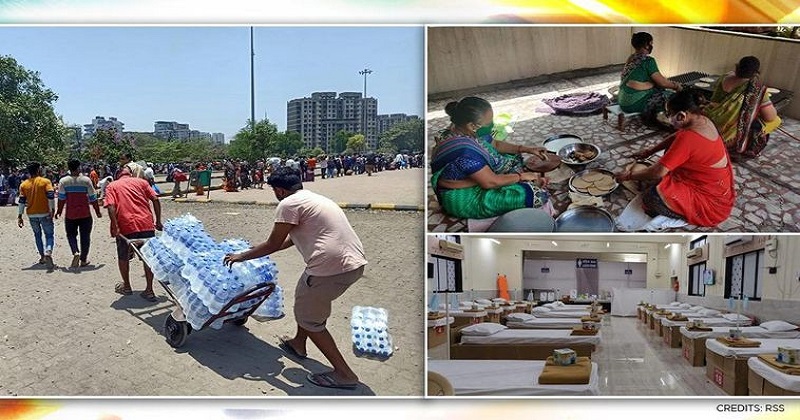
The Bharat Gold Mines Limited (BGML) hospital in Kolar 100 km from Karnataka’s capital city Bengaluru came back to life. The hospital, shut for almost 20 years, had started taking patients again. It took almost 300 Rashtriya Swayamsevak Sangh (RSS) volunteers two weeks to clear up the debris, weeds, and cobwebs and restore the 800-bed hospital, constructed in 1880. The hospital can hold 300 patients. Kolar, by May 15, had recorded 5,106 active cases and 256 losses. The state’s deputy chief minister, C.N. Ashwathnarayan, has made preparations for oxygen concentrators and other medical stocks to be given to the facility, while local MP S. Muniswamy has anchored the entire process. “It was a joint operation with the society, government, and RSS volunteers,” says Parag Abhyankar, Akhil Bharatiya Seva Pramukh, RSS. “If this can serve the purpose of helping the society in this time of despair, the efforts are worth it.”
With the second surge of the pandemic showing to be far more destructive and dangerous than the first, many RSS members have been employed by the NGO Rashtriya Sewa Bharati to help the condition in remote regions. “The COVID cases are reaching far-flung areas and there is not much information and awareness about the disease there. Some reports are suggesting that this time it is airborne. Like the Vanvasi Kalyan Ashram, which is helping tribals in Chhattisgarh get screened and spreading awareness about Covid and its treatment, Bharat Vikas Parishad (another RSS affiliate) is working with businessmen in Kota, Rajasthan,” says Abhyankar.
Top RSS executives state that last year the disaster was confined to relief operations needed for migrants giving food to the poor. But this time, the call is medical assistance, for obtaining oxygen, supporting people with conducting cremations. The Rashtriya Sewa Bharati has backed RSS members set up Covid care stations in 118 cities and towns, isolation centers in 287 cities and towns this includes promoting 4,193 plasma donations in addition to fixing up isolation centers in schools in villages with the aid of volunteers.

In mid-April, the RSS devised a multipronged approach to combine these efforts and counter the environment of “negativity” under its fresh umbrella vehicle, Covid Response Team (CRT). The Rashtriya Sewa Bharati has been berthing these trials and began this work in Delhi, and has moved on to replicate it in other cities, such as Indore, Bengaluru, Mumbai, Ahmedabad, Patna, Hyderabad, and Pune, among others. The CRT has also fixed up a helpline with 1,200 volunteers and 130 doctors. The helpline, by May 15, received over 88,000 calls.
The CRT is being together directed by Lt Gen. Gurmeet Singh (retd.) and Ramesh Agarwal, president, Sewa Bharti, and is seeking aid from industry bodies such as FICCI, CII, Laghu Udyog Bharati, and CAIT; professional organizations such as ICAI, ICSI, ICWA; religious and spiritual organizations like Patanjali Yogpeeth, Isha Foundation, Art of Living Foundation, Sanatan Dharam Pratinidhi Sabha; and social organizations like Lions Club, Vishva Hindu Parishad, Swadeshi Jagran Manch, and Rotary Club.
The work has been distributed into 13 significant operative sections, including dialogue with some of the best brains in medicine, giving health equipment, hospital capacity augmentation, helping livelihood for families of a Covid victim, counseling, doing arrangements for Oxygen and ambulances, and cremation and last rituals for Covid victims. This is possibly one of the largest relief plans in the country mounted by a non-government organization. “The coordination and smooth functioning between all the verticals and affiliates is a big challenge, but we are trying to do our best with the limited resources we have and with the help of the local communities and bodies,” Abhyankar says.
Read more; “Narco-terrorism case”: NIA files additional charge sheet
The CRT has set up nine isolation Centres with the range of around 500 beds in Delhi; is serving with temporary oxygen stocks to patients expecting hospitalization through seven mobile Oxygen vans called ‘Oxygen on Wheels’ furnished with six beds each; is constantly giving food for over 28,000 families of Covid patients, especially senior citizens, and economically more backward persons; has prepared 803 plasma donations and 1,300 CT scans, and helped families with 2,619 cremations. “last year, it was very painful to see the plight of migrants and we did what we could to help. This time the situation is grim and we can only provide the support system to those who are determined to save human lives. The message is clear to our volunteers, do as much as you can, but keep yourself safe too,” adds Abhyankar.

Post Your Comments